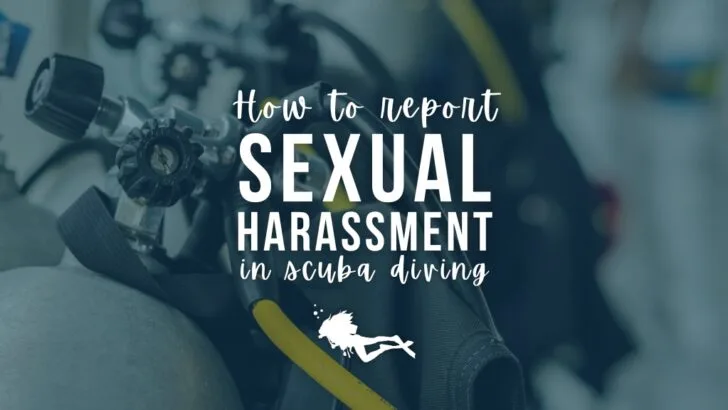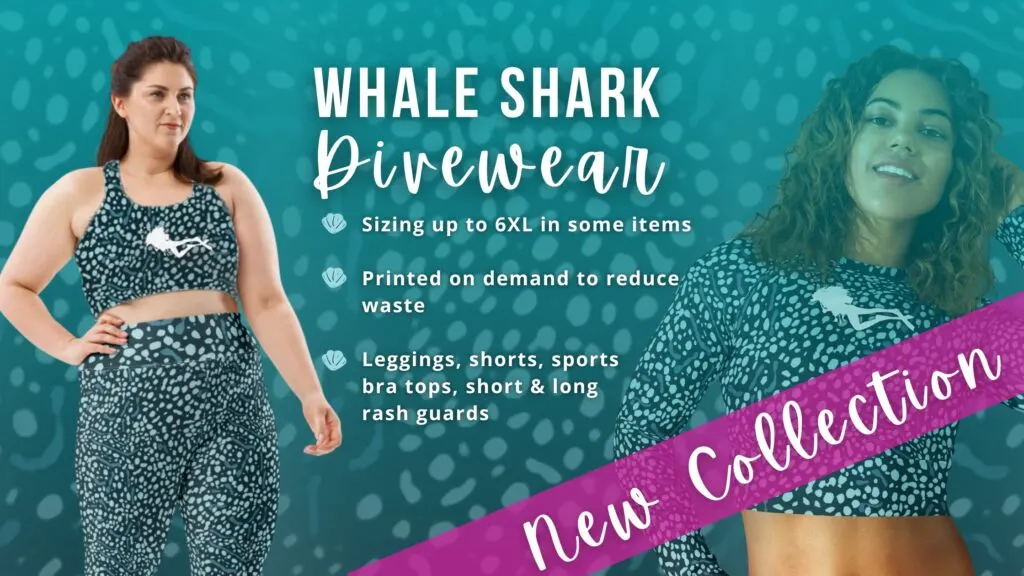At Girls that Scuba, we’ve been talking about sexual harassment in diving for a long time. A recent survey affirmed that this is still a huge issue. We care deeply about the safety and wellbeing of all divers, and sexual misconduct is something that more of us need to be talking about.
We know that sexual harassment in diving is not taken seriously enough. But what happens if you actually experience it? Where do you go to report sexual harassment in scuba diving? The answer isn’t always clear.
As the world’s largest scuba diving community for women, reports of harassment and assault are brought to us on a regular basis. Based on the many experiences which have been bravely shared with us, here are our recommendations for how to report sexual harassment in diving.
Trigger Warning: This guide contains reference to sexual harassment and assault, which may be distressing or triggering for some readers. Please take care of yourself and skip this content if you need to. Support resources are listed within this post.
1. Take care of yourself first
If you or someone you know has experienced sexual harassment, misconduct, or assault in diving:
- You are not alone.
- Your experience matters.
- You deserve to be heard and supported.

The first step to take after experiencing any type of sexual harassment or assault is to take care of your own mental health. Navigating the reporting process can be a huge mental challenge – you may be discussing your experience multiple times, which can be incredibly tough.
Here are a few of the challenges you may face in reporting:
- Dive agencies may not be as receptive as you would hope. Be prepared that some certification agencies may prioritise their liability over your well-being.
- Cultural and legal differences by country can complicate responses. With diving being so international – some people diving at home, many diving abroad – experiences with reporting can vary hugely.
This shouldn’t deter you from reporting, we just believe it’s important to be mindful of what you may face when reporting. To prepare yourself for these potential challenges, seek support from a trusted organisation or advocate before submitting reports. We have included links to global resources at the end of this post.
We’ve tried to include as much information as possible in this guide, but not all advice will be relevant to every situation as each situation is unique.
2. Report to authorities
In serious sexual assault situation, local authorities should be your first point of contact. We believe that survivors should be believed. However, many dive agencies may not take reports of sexual assault seriously without seeing evidence that it has also been reported to an authority.

Local police
If you’re in your home country, local police should generally be helpful. In some locations though, local police are not always receptive to issues reported by, or about, non-locals. Some popular tourist destinations will have specific tourist police, which can be more receptive.
Embassies
If you are abroad and local police or tourist police are still not helpful in accepting your report, you could also try your home country’s embassy in the country you are in.

Other Authorities
Depending on the country you were in, there may be other authorities which you can report to. For example, if you experience an incident of sexual harassment on board a dive boat based in the US, the US Coast Guard encourage reports to be shared with them.
3. Report to the dive agency
Most major dive agencies should have a reporting system to ensure that all of their courses are being conducted safely and correctly. Reporting sexual harassment, misconduct, or assault usually follows the same route as reporting a training violation.
Here’s the information which is available about the reporting processes or contact details for some of the major training agencies:
PADI
Report to PADI’s Quality Management program. Email your report to [email protected]
SSI
SSI’s website does not detail any reporting process for their professionals. Following their Consumer Protection link only allows you to search whether your dive professional is “Active and Certified”. We would suggest emailing your report to the relevant SSI local Service Center, for which contact details can be found here.
SDI/TDI/ERDI/PFI
SDI/TDI’s Consumer Protection page does not detail any reporting process, but does share their list of expelled and suspended professionals. We recommend emailing your report to your local regional office, as listed on their website.
BSAC
BSAC publishes much more thorough details on their reporting systems than many of the other agencies. Their entire Adult safeguarding policy is published online in full, with valuable resources for divers to learn from. All BSAC clubs should have a Club Welfare Officer who you can report to within your club. Their Adult safeguarding flowchart is their best resource for determining the correct course of action. For reports, their adult safeguarding reporting form can be submitted (either to the Welfare Officer or directly to BSAC, depending on the outcome from following the flowchart).
NAUI
NAUI is another of the more transparent agencies sharing their processes, with an entire area on their website dedicated to Consumer Protection. Reports can be easily submitted via their simple online form.
RAID
RAID does not share any information on their reporting processes, but does share their expelled members. Their Regional Offices are listed with individual contacts, so reports should be directed there.
GUE
GUE’s approach to Quality Management is published in their standards, which are available to view online. Reports can be directed to [email protected].
Information to include in a report
When sharing your experience, you’ll want to include the following details in your report to the dive agency:
- Dive instructor name and dive shop name
- Date and location of the incident
- Description of your experience
- How it made you feel
- Request to the agency for details on their next steps
Here is a template which may be helpful in forming your report.
Subject: Quality Assurance Concern Regarding Professional Misconduct
Dear [PADI/SDI/Other Training Agency] Quality Management Team,
I am writing to formally report an incident involving [Instructor Name, Dive Center Name if known] that occurred on [Date, Location if applicable].
I experienced [briefly describe the behaviour — e.g., sexual harassment, inappropriate comments, unwanted physical contact] while participating in a dive activity organised or instructed by this individual.
This behaviour made me [feelings such as, feel unsafe, disrespected, violated]. I believe it breaches your Code of Ethics and undermines the professionalism of your instructors.
I am requesting that this incident be formally reviewed and that you advise me on the next steps for resolution and support.
Confidentiality and trauma-informed communication would be appreciated as you proceed.
Sincerely,
[Your name]
[Optional: Contact email or phone]
4. Continue to seek support
When you’re going through the process of reporting this experience, which is likely to have been traumatic to you, it’s important that you continue to take care of yourself. Make sure you’re still seeking support throughout the process. This might look like:
- Sharing your story with friends, family, and trusted people within your dive community
- Therapy sessions with a trauma-informed professional who can help you work through your emotions
- Getting help from free resources, such as the helplines and resources listed below
The Girls that Scuba Facebook Group
Many women choose to come to us and share their stories with the Girls that Scuba community. We’re so grateful that we’ve created such a safe space that people feel that they can bring these stories to us, with the knowledge that they will be supported and heard by their fellow members.
However, we want to be transparent about our Facebook Group rules. We do not approve posts that name individuals, or posts which include detailed accounts of sexual harassment or assault. This is not because we don’t believe survivors. It’s because we are a predominantly volunteer-run community and not a professional, trauma-informed or legal authority.
We have a responsibility to avoid posts that could result in defamation claims or the retraumatisation of others. Ethically, we have to protect both the safety of our members and the integrity of the space. Sexual harassment or assault is an incredibly serious issue that deserves to be handled by trained professionals who have the resources, accountability structures, and legal authority to take appropriate action.
We will continue to welcome posts which are seeking solidarity, guidance or community, but we are not in a position to share detailed accounts. We know this can feel frustrating or even like we’re ignoring the issue. But the truth is, we want to make sure that stories and reports are handled by the right people – those with the training, power, and resources to act.
That’s why we created this guide. We hope that this will help point people towards professional support and official reporting channels, whether that’s through a dive training agency, a survivor advocacy organisation, or a legal route in your country.
Non-diving support resources
Here is a list of resources which may be helpful in seeking support after experiencing sexual harassment, misconduct, or assault. Please note that none of these are dive-specific, but may be helpful in dealing with the emotions that can arise after these experiences.
International Support
- WAVE Network – A comprehensive list of helplines and shelters across 46 countries.
- TST Resources – Resource library for navigating many emotions and experiences after sexual assault.
- Chayn – A global nonprofit creating open-source resources for survivors, in multiple languages.
- Hollaback! – International volunteer-run movement to end harassment in public spaces and online. Offers support, as well as bystander training and self-advocacy guides.
United Kingdom
- Rape Crisis England & Wales – Free, confidential support and advocacy.
- SurvivorsUK – Support for men, boys, and non-binary people who’ve experienced sexual abuse
- The Survivors Trust – A UK charity offering specialist sexual violence support services.
United States
- RAINN (Rape, Abuse & Incest National Network) – You can also call their 24/7 hotline on 1-800-656-HOPE.
- NSVRC – National Sexual Violence Resource Center.
- End Rape on Campus (EROC) – Advocacy and resources for student survivors.
Canada
- Ending Violence Association of Canada – Connects survivors to local support.
Australia
- 1800RESPECT – National sexual assault, domestic and family violence service.
- Full Stop Australia – Offers trauma counseling and workplace education.
New Zealand
- HELP Auckland – Specialist support after sexual harm.
- Safe to Talk – Confidential, nationwide sexual harm helpline.
South Africa
- TEARS Foundation – Offers helplines and a resource database for survivors.
- Rape Crisis Cape Town Trust – Counselling, advocacy, and training services.
India
- iCall – TISS – Free, confidential mental health and violence support helpline.
- Sayfty – Volunteer initiative providing legal guidance and an online survivors’ toolkit.
Malaysia
- WAO – Women’s Aid Organisation – Offers counseling and legal advice.
What else can we do?
Even if you haven’t experienced sexual harassment in diving, the fact that it happens is undeniable. We need to keep talking about it. Girls that Scuba community member, Tamara Adame, published a sobering piece in InDEPTH magazine. Her article adds important insight into how these statistics play out in real-life for divers, and also serves as a call-to-action for the industry to do more.

78% of divers who had reported their experience to a dive training agency were NOT satisfied with the response, and a further 17% did not know if they were satisfied with the response. This is further evidence that the dive industry is not doing enough to take this issue seriously.
A recent petition has called for dive training agencies to take much more responsibility and action in protecting divers from sexual harm. We highly encourage all divers to sign this petition for the protection of all divers and the overall safety of our industry.


